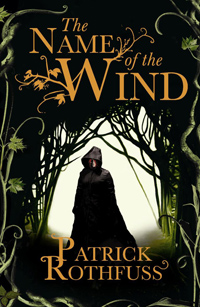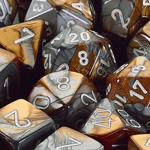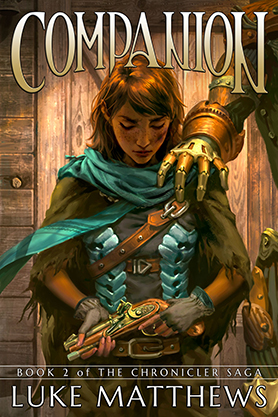Alright, here it is. At some point I had to develop the balls to put my writing out in front of people, and today is that day. Below, you will find the first chapter of the manuscript I’m working on right now, called Construct. Feel free to offer feedback, preferably in the form of a showering of unadulterated praise.
Please to enjoy Construct: Chapter 1.
The images crashed into him, lifting him and roiling about him like the drag of storm-swelled surf, like memories but somehow not, somehow foreign. Too fast and confused to make sense of, and yet some few stood out from the others, splitting through the morass of pseudo-rememberances, plastering themselves against his waking mind.
• • • • • • • • •
Cold eyes bore into his, close enough that he could see nothing else. Their color could have been grey or blue, but reflected a silver sheen in the dim light. The voice that came from beneath them was little more than a whisper, forming words laced with a killing trace of deep malice. “You made it too easy for us, canner. You’ve denied me my challenge, and I can’t abide boredom.”
He felt fingers press into his chest, and coldness rushed into his core. His sight flooded with blue light which was extinguished as fast as it had come, leaving only darkness. The feeling of cold was being replaced by numbness, and even his hearing was beginning to falter. In his last moments he heard distant echoes of conversation somewhere above him.
A second voice slinked into his hearing, chilling him even through the spreading numbness. “There’s too much. It’s too obvious, and we’re out of time here.”
The voice with silver eyes replied. “Then burn it. Burn it to the ground.”
• • • • • • • • •
Despite his efforts, he could not move. He lay on his side in the coagulating gore, unable to tear his eyes away from the grisly scene laid out before him. He didn’t know the woman’s name but he recognized her face from somewhere. Where had he seen her before? What had she looked like alive?
He’d been here before, not long before, and had fled. What had drawn him back here? A noise drew his attention, someone at the front door. He knew he must leave, and tried again to move but his limbs would not function, and it was as though a great weight bore down on his chest.
His fingers twitched. He was regaining his facilities, but he feared at too slow a pace. The knocks at the door became more insistent, the calls of the men outside unintelligible. One final push and he rolled, his arms and legs gaining mobility, but burdened with agonizing weakness. As he gained his feet, the knocks had transformed into crashes, and the door burst inward.
He turned as the men rushed in, holding up his hands to protest his innocence, but his voice failed him. Something struck him on the shoulder, sending a shockwave through his body and weakening him further, driving him back to his knees. Fires of hatred burned bright in their eyes as they continued hitting him, each strike of their clubs carrying more than just impact, sapping his energy – his life – away.
Falling prone to the floor, his face came to rest in a cool, sticky pool of drying blood. Once again he saw her face, her eyes still open as though pleading with him for help, just as she had in the last moments of her life. Another strike; everything was gone.
• • • • • • • • •
The pleasant scent of wood fire drew him back to consciousness, reminding him of some far off place, of a distant memory he couldn’t quite grasp. When his vision returned he couldn’t focus – a confusing jumble of items blocked his immediate view. His head was turned to the left, and he was looking at what appeared to be a pile of wood. A pile of books… and a fallen bookshelf.
He was lying on the floor. He tried to get his legs under him – they were heavier than he expected – and as his weight shifted he realized he was pinned. Maybe not pinned… but there was weight on his chest that was not his own, and his weakness was disorienting. His eyes slid downward, away from the rubble and to his own torso.
An unmoving arm lay across his chest, whose length disappeared under heavy form of the downed bookshelf. The hand at its end was supple and young, but the fingers were scarred. Not the scars of cuts, but more of light burns, like someone who works with wax or molten glass. The hand’s two middle fingers bore silver rings, which together formed the image of two writhing winged serpents locked in mortal combat. No, not two rings… one, linking the two fingers just behind the first knuckle. Above the wrist was as tightly buttoned white cuff of a simple cotton tunic. Past the cuff the white cotton changed, sewn with a random pattern. No, not sewn… perhaps dyed?
He turned his head to get a sense of his surroundings. The room was small and cluttered, tables and shelves filled to overflowing with books, parchment, glass phials, small dishes, and unrecognizable tools. The floor was littered with haphazard piles of random items, and one of the worktables across the room had been upturned, its contents a shattered mess on the floor beside it.
The wood fire smell came to him again, stronger now and tinged with another bitter scent. His gaze moved upward along a bookcase whose contents lay in heaps before it, and whose top was obscured somehow as it connected with the room’s ceiling. The ceiling itself roiled as though insubstantial, more gaseous than solid, and bore with it a terrible realization:
The building was on fire.
But what building? he wondered. He had no idea where he was, and no memory of how he got there. The smoke was pouring down the walls now, beginning to descend toward him. He could hear the flames licking at the borders of the room, the incessant crickle-crackle of dry leaves crushed in calloused hands, and he sensed the heat. His vision dimmed and his head thumped heavily back to the wooden floor. A weakness overtook him, for only just a moment, and then his strength returned. I have to get out of here.
He reached up to his chest; the dead hand upon him was nothing like his own, softer and more delicate, and bearing one more finger opposing its thumb than the three that adorned his. The differences between the two did not end there: his was covered in an orange-brown worked metal, like armor of copper or bronze, but still moved with a subtlety that an armored glove would not allow. His mind tried to reconcile the differences between the two, but he could not decide which was normal and which was out of place. Searching his mind for any memories that would help him discern not only where but who – or what – he was, he found only a yawning void. Prior to the moment where he awoke to the smell of smoke, there was just… nothing.
He lifted the dead arm away from his chest, thinking to push himself out from under its owner. At this attempt he found his left arm and hand were useless, giving him no leverage to move, so he dropped the scarred hand to his side and rolled. It landed with a slap! as he shifted away, an unexpected sound on the wooden floor, and he saw over his shoulder a still-expanding pool of fresh blood seeping from under the bookcase. The pattern on the sleeve was not dye after all, and whatever happened to this person was a very recent memory.
His hips carried him out from under the body and the bookcase, his shoulder smearing blood across the floor from the pool in which he lay. As he came upright, his useless arm thudded heavily against his body, swinging on a crippled shoulder joint, and he found that even his fingers wouldn’t move. He began his search for an escape, but wheeled back next to the pool of blood. Lifting the dead hand from the floor, he fumbled to removed the serpent-ring. It wouldn’t fit over his armored and oversized middle finger, so he hooked it around the smaller outside finger, thinking to carry it there until he could find a place to store it.
As he searched the room for an exit, he found the only door to the room blocked by the fallen bookcase, and the rest of the room was in ruins. The floor and tables were littered with broken glass and unnamable liquids, parchment was strewn, books had been carelessly tossed from shelves and lay in heaps in the corners. He pulled his feet in and balanced above them, and could feel weakness in his stance. His movements were jerky and stiff, his joints creaked as like a warped door on rusty hinges.
Hooking the fingers of his good hand under the fallen bookshelf, he widened his stance and pulled with every ounce of might he could gather. A subtle shift but nothing useful, more due to the relative softness of the support beneath than any result of his efforts. If this shelf would not move, the door behind it would not open, and flames from all sides would decide his fate. He tried the door anyway; as he suspected it opened inward.
Damn this broken limb, he thought. With two good arms I could make a solid effort at it, but like this… He moved to the other end of the room, looking for anything that might help him gain some leverage against the debris. Everything in the room seemed delicate – all glass and spindles and parchment. The smoke hovered lower now, and he could see the heat radiate inwards from the door.
He swooned again, his senses dulling. The floor floated and bucked beneath him and his balance failed, pitching him forward to his knees. Tipped onto his good right hand, his defective left thunked hard on the wooden floor as the serpent ring skittered away under the nearest table. He tried to shake free of the haze, but he could feel his consciousness being sapped, as though someone or something was draining his will. He crawled forward, fumbling for the dropped ring and willing himself to retrieve it, his bewildered mind clinging to the idea that it was somehow important.
His mind came back to him and he surged forward, grasping the ring and powering himself back to his feet. His search became more frenzied, pulling more books from shelves and rooting through piles of flotsam trying to produce any idea or conclusion. His search revealed nothing of use, only more books, phials, oddly shaped tools, tubing of all sizes, parchment, some long rags, and a heavy cloak. The cloak, perhaps? Maybe I can wrap myself in it and when the flames weaken the wall, I can make a dash for it…
A foolhardy plan, but it was all he could manage as he fumbled himself into the cloak, pulling it over his damaged shoulder. Inside it he found several small pockets, into one he dropped the serpent-ring. He reached up and donned the hood, clutching the cloak closed at the neck, and waited.
The heat was stifling, and the air in the room would soon become dangerous. At the room’s periphery, papers curled and darkened, not burning yet but warping under the waves of heat. Leather bindings on ancient books shriveled and twisted, the pages shrinking inside their covers. Small stacks of parchment that had been laid atop rows of books on the shelves curled and fell, some bursting into random flames as they floated toward the floor. The inside of the room was beginning to burn in earnest.
A tendril of the ever lowering smoke caught his attention, twisting down out of its cloud and slinking away between two of the bookcases at the rear of the room, opposite the door. He lunged for the corner, probing the fingers of his right hand between the shelves, looking for anything that would lead to the opening where the smoke was being pulled. When nothing obvious presented itself, he grabbed the edge of the corner bookcase and pulled.
It moved.
He pulled again, harder this time, and the bookcase swinging outward rather than falling over, but stopped against a jumble of books. He kicked away the pile and grabbed the shelf again, planted his foot against the neighboring support, and heaved. In spite of his languid effort, the bookcase hinged open, a space of only a foot or so, but enough that he could see (and possibly move) behind it.
Behind the opening was a small chamber, no more a meter or so square, with a low angled ceiling and… no doors or windows. Confused, he searched the room for anything he could see, but the space was becoming obscured by smoke that was now billowing in. Over his shoulder, the door had caught fire, and hungry flames licked upward, sending tentacles of heat across the ceiling and down the opposing wall to consume the books on the top shelves. Soon, the entire opposite end of the room was on fire. The smell of woodfire was replaced by the sweet smell of burning flesh as the tumbled bookcase began to burn, and its prisoner along with it.
Inside the chamber the smoke, no longer swirled and disturbed by his frantic search, began to settle but perhaps too far, drawn between the cracks in the chamber floor. Is there an opening underneath? He pushed his way inside, splintering the old wood on the backside of the bookcase with his shoulder, and dropped to his knees. His good hand searched every nook and crevice in the floor, his fingers failing to find purchase until he noticed that one board ended short of the rest. Inward from the board’s end he saw the glint of metal reflecting the firelight in a split in the wood. He dug his fingers into the split and pulled, and it hinged open to reveal a large iron ring beneath. A trap door!
A loud crash startled him out of his bemusement. The room had begun to collapse, the walls and supports engulfed in ravenous flame. He lurched up and away, his feet just barely outside the small chamber and off of his glorious escape door. Grasping the iron ring, he gave as mighty a yank as he could muster and… nothing. Weakness had betrayed him and the iron ring held fast, the wood of the false floor barely creaking under the not-so-mighty pull.
Hellfire and heat filled the space at his back, and everything in the room began to crumble. Shelves fell away to the floor as their supports burned, glass melted atop worktables that had turned to elevated pools of fire. Parchment flared and burst, and glowing embers of paper swirled in the superheated air of the oven-room. Flames touched at his face as the moving bookcase caught, and he bent again for one more try. One more try, he thought, because if it doesn’t open this time I’ll be charcoal.
With his good hand he gripped the ring tight and crouched down, prepared to throw his entire body into the pull. His legs and back uncoiled and, with a creaking sigh, the trapdoor swung upward. He braced his hand on the underside of the door, pushing it back as he moved forward over the open space. The darkness beneath gave no hint to where he would end up, but it couldn’t possibly be worse than where he was.
Even so he hesitated, looking one last time back into the burning room into which he had been born only moments before. He felt distant, spying the room through a looking-glass, and his thoughts fell away into a murky weariness. Slipping downward, the whole weight of him dropped into the darkness beneath the trap door, which slammed shut above as the room collapsed in a heap of flaming debris.










